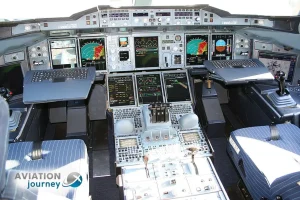inside the A380 Cockpit: A Pilot’s High-Tech Office
Airbus A380 cockpit is the height of modern flying technology specifically designed to fly the world’s largest commercial airplanes with outstanding efficiency. First, the pilots are greeted with a spacious desk area that boasts eight large LCD displays instead of antiquated analog gauges, with tactile digital information readily available at a glance. The innovative side-stick control units, comfortably resting at each pilot’s side, replace antiquated yokes and work together with complex fly-by-wire systems that translate delicate inputs into silky aircraft movement. Logically organized switches managing systems are placed in overhead panels, and the throttle quadrant in the center of the cockpit controls the gigantic engines with silky precision. What truly makes this cockpit unique is its Commonality with other Airbus types – pilots transitioning from smaller Airbus aircraft find familiar arrangements and procedures, reducing training time radically. On long-haul flights, the elegantly designed ergonomics bear their fruit, with adjustable seats. The combined avionics capabilities such as synthetic vision, weather radar, and predictive windshear detection.
• It’s designed to make flying easier and safer
• It uses smart computers to help pilots
• Everything is arranged for maximum comfort during long flights
Let’s take a close look at what makes this cockpit special.
See also:Frankenjet F-35: The Ultimate Hybrid Fighter
The A380 Cockpit Layout: A Pilot’s Office
Imagine a spacious room with all the controls a pilot needs. Here’s what you’d find:
-
The Big Screens Up Front
-
Two large displays show all the important flight info
-
Pilots can touch these screens to make changes
-
Are old fashion dials as backups too
-
-
The Overhead Control Panel
-
Buttons and switches for all the plane’s systems
-
Controls for engines, lights, and air conditioning
-
Many things start automatically with just one button
-
-
The Side Sticks (Instead of a Steering Wheel)
-
Small joysticks on each side for the pilots
-
They’re more comfortable than big steering wheels
-
Electronic signals tell the plane how to move
-
-
The Engine Power Controls
-
Four levers (one for each engine)
-
Can control manually or let the computer manage speed
-
-
The Information Screens
-
Show engine performance and fuel levels
-
Display weather maps and other aircraft nearby
-
How Pilots Fly This Giant Plane
The A380 is so advance that:
See also:Rory McIlroy’s Private Jet: A Champion’s Travel Secret
The Plane Can Almost Fly Itself
-
Autopilot handles most of the flight
-
Can even land itself in bad weather
But Pilots Are Always in Charge
-
They constantly check all the systems
-
They practice manual flying regularly
-
Two pilots work together at all times
Safety Is Built In
-
Computers warn about any problems
-
There are backups for all important systems
A380 vs Older 747 Whos strong?

| Feature | A380 | Boeing 747 |
|---|---|---|
| Controls | Side sticks | Big steering wheel |
| Displays | All digital screens | Some old dials |
| Automation | Very advanced | Less automated |
| Space | More room | More cramped |
Why side sticks? They’re more comfortable and give pilots more space.
What’s Next for A380 Cockpits?
Even though they’re not making new A380s, the existing ones are getting:
• Newer touchscreen displays
• Smarter computer assistance
• Better fuel-saving flight plans
FAQs
Can one pilot fly the A380 alone?
No, there are always two pilots, but the computers help a lot.
Why no steering wheel?
The side sticks are more comfortable, especially on 14-hour flights.
How long to learn to fly it?
About 2 months for pilots who already fly other big jets.
Is it like other Airbus planes?
Yes, A320 pilots can learn the A380 quite easily.
See also:Airbus A300-600ST Beluga: Oversized Cargo Transport Giant
Overall
The a380 cockpit flight deck is the ideal blend of state–of-the-art technology and pilot-centered design. The real reason this flight deck stands out is the way it makes the complicated job of flying the world’s largest commercial jet an intuitive process. Intelligent automation manages mundane tasks while maintaining pilots firmly in control, with intuitive side-stick controls responding to the lightest touch. Each switch, screen and control has been precisely placed to reduce pilot workload on those grueling 14-hour flights. The system’s master design enables crews to see all four engines, hundreds of passengers, and thousands of systems at a glance. when the autopilot retracts, the A380 is surprisingly nimble for something of its stature. It is not simply a assemblage of computers and screens, but a reflection of Airbus’ grasp of what pilots really require, building an atmosphere in which human dexterity

